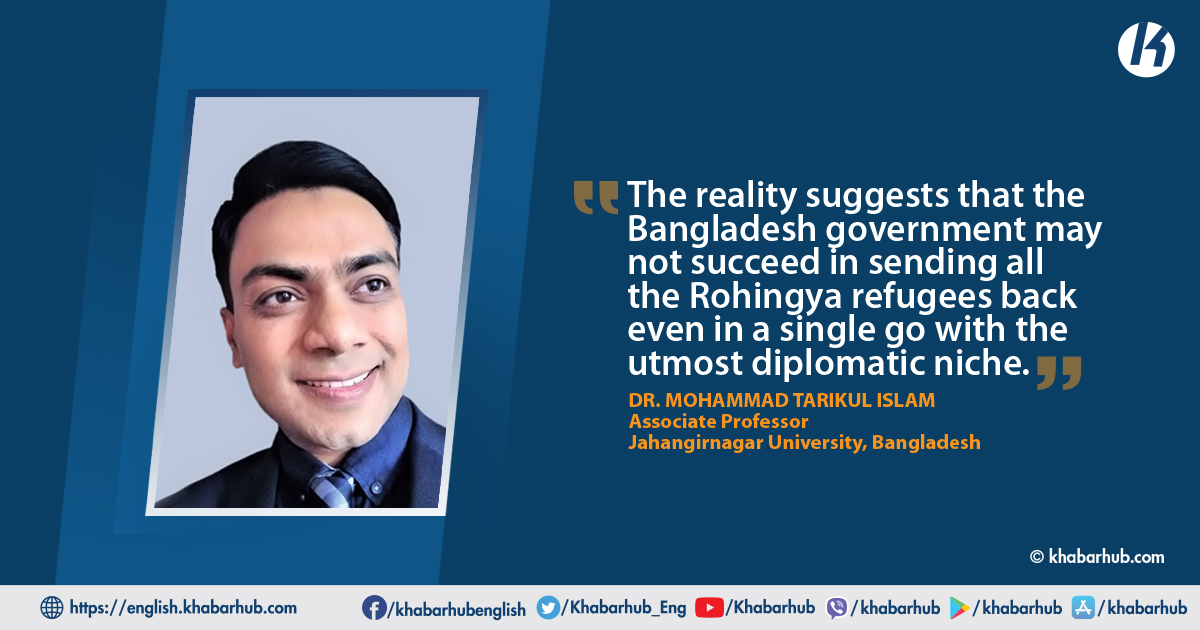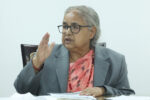If you are hopeful, you are fairly confident that something that you want to happen will happen. How far UN tries to resolve the Rohingya crisis? I was listening to the speech of Bangladesh Volkan Bozkir, President of the United Nations General Assembly (UNGA) who visited Bangladesh on 25 May 2021.
He praised the efforts of the Bangladesh government as Bangladesh has set a good example of how refugees should be treated highlighting the facilities in Bhasan Char, the government has provisioned for the Rohingya people.
Prime Minister of Bangladesh Sheikh Hasina expressed concern about the repatriation of Rohingyas saying “the situation has become uncertain due to the recent developments in Myanmar”.
There is hope given by the visiting UNGA President to call for another general assembly on the Myanmar issue where members will discuss all the aspects and try to find a consensus.
Due to persecution, the Rohingya, an ethnic minority group in Myanmar crossed into neighboring Bangladesh over decades, laying uneven pressure on the scarce resources of Bangladesh.
Bangladesh is apparently hosting around one million Rohingya refugees. Myanmar government has been very reluctant to take back their nationals, the Rohingya, despite the robust diplomatic endeavors of the Bangladesh government regarding repatriation.
Given their living space mostly located in Teknaf-Cox’s Bazar areas, the refugee earmarked areas are adjacent to the settlements of the local citizens.
Once, many awkward incidences happened between them causing law and order situations. Security concern particularly non-conventional (human security), is another challenge that Bangladesh is already facing and it will intensify further in the future with the influx of Rohingya refugees over the years.
We have noticed China is having a huge strategic and economic interest in Myanmar. Even Russia seems compassionate to Myanmar on this issue.
Bangladesh could be credited for making every effort in a professional fashion to harness regional and global power to end an amicable solution to this emerging crisis.
Bangladesh’s government has been experienced over the months while unveiling their diplomatic efforts in persuading Myanmar to repatriate the refugees.
However, the reality suggests that the Bangladesh government may not succeed in sending all of them back even in a single go with the utmost diplomatic niche.
Therefore, we may think of some long-term solutions to deal with this additional population in Bangladesh. Though Myanmar holds no major importance in Russian policy – no geopolitical interests are at stake there, while Moscow’s attitude to the issue in the UN could potentially upset its Muslim allies, for instance, Iran.
As I teach politics, I had decided to complement the diplomatic efforts of the government of Bangladesh through research for the amicable solutions to the Rohingya crisis.
It was in the mid of 2018 when I was influenced by one of the British Scholars to research the state of human security in the Rohingya Camps and their repatriation.
I am currently researching the impact of geo-politics on the repatriation of Rohingya refugees. This research critically analyses the geopolitical interests of China and India centering on this evolving crisis.
My ongoing research explores the interplay between Bangladesh’s formal and informal diplomacy narratives and regional cooperation discourses on the repatriation of refugees, drawing upon theories of public diplomacy, regional cooperation, and non-conventional security studies.
As stateless evacuees, they have become the substance of security dangers just as different types of psycho-social and human security challenges in Myanmar and in their new host nations across the area like Bangladesh. Taking care of security concerns is impossible to the detriment of helpful necessities.
The undertaking aims to contribute to the diplomatic approach of the government of Bangladesh in the changed circumstances after capturing the state power of Myanmar by the military in early February 2021.
Let’s talk about the bilateral agreement signed in 2017 as Myanmar and Bangladesh agreed in late 2017 to complete the return of hundreds of thousands of Rohingya refugees within two years, notwithstanding international doubts that they will be held in forbidding detention camps that may result in another round of cruelty both physically and psychologically.
Bangladesh could be credited for making every effort in a professional fashion to harness regional and global power to end an amicable solution to this emerging crisis.
Bangladesh’s government has been experienced over the years while unveiling their diplomatic efforts in persuading Myanmar to repatriate the refugees.
However, the reality suggests that the Bangladesh government may not succeed in sending all of them back even in a single go with the utmost diplomatic niche.
The military coup in Myanmar on 1 February 2021 has raised fears in neighboring Bangladesh that the new regime may not honor commitments to repatriate Rohingya Muslim refugees currently in Bangladesh.
Bangladesh firmly adheres to and promotes democratic ethos. Bangladesh believes the democratic process and constitutional arrangements will be upheld in Myanmar.
What it really implies is that Bangladesh presently feels that the genuine answer for the Rohingya emergency is serene and manageable bringing home.
I believe, Bangladesh government will work persistently with the Myanmar government for the voluntary, safe and sustained repatriation of the Rohingyas sheltered in Bangladesh.
Again, the international community led by the United Nations must stand in solidarity with the government of Bangladesh at this time, and for all states with influence to take steps in the repatriation of Rohingya refugees to Myanmar alongside pressurizing the military government for the restoration of democracy in Myanmar.
Experts view that, the Chinese proposal, if implemented, would pave the way to restoring peace in the region and rehabilitate all the refugees who had fled to Bangladesh and other countries.
Precisely, there is a growing apprehension among the security experts that the huge influx of the Rohingyas during the most recent many years is making a multidimensional security emergency.
As stateless evacuees, they have become the substance of security dangers just as different types of psycho-social and human security challenges in Myanmar and in their new host nations across the area like Bangladesh. Taking care of security concerns is impossible to the detriment of helpful necessities.
Still, others propose that safety efforts are required in light of the fact that the outcast emergency is causing unsteadiness, prompting a genuine decrease in exchange and business, particularly in the Bangladesh-Myanmar relations.
Security experts have a kind of positive gesture towards a three-phase proposal given by the Chinese Foreign Minister.
According to a three-phase proposal to address the crisis and promote stability advocated by the Chinese Foreign Minister Wang Yi, in the first phase, Myanmar’s army should be proactive to restore order by declaring a ceasefire to stem the flood of refugees.
In the second phase, both Myanmar and Bangladesh should be encouraged to talk so as to find a feasible approach to settle the issue where the international community should play an active role.
In the third phase, the international community must work with an agreed work plan mobilizing adequate resources to help rebuild the Rakhine state.
Wang must be credited for garnering support for this proposal from Myanmar’s de facto leader Aung San Suu Kyi, President Htin Kyaw, and military chief Min Aung Hlaing, as well as the government of Bangladesh, before unveiling the plan.
For the sake of humanity, the international community must take due steps immediately for the peaceful and dignified repatriation of Rohingya for the greater interest of peace and tranquility in the region.
Experts view that, the Chinese proposal, if implemented, would pave the way to restoring peace in the region and rehabilitate all the refugees who had fled to Bangladesh and other countries.
As Bangladesh and China have continued to consolidate their economic and trade relations as well as have built a comprehensive institutional framework to promote bilateral cooperation over the decades, China must come forward to join hands with the Bangladesh government for a swift repatriation of Rohingya refugees.
United Nations, which is found to be very emphatic for meaningful repatriation of Rohingya refugees from Bangladesh must coordinate and communicate with donors and other relevant stakeholders to come forward to solve this problem permanently by putting pressure on the Myanmar government to take back its citizens by creating a safe and secured environment.
The UN, at the same time, must enforce the recommendation of the Annan Commission by applying diplomatic pressure on Myanmar.
The UN Security Council should initiate a visit to the Rohingya refugee camps to force the government of Myanmar for setting up “safe zones” for people of all backgrounds in conflict-torn parts of Myanmar as proposed by the Prime Minister of Bangladesh.
For the sake of humanity, the international community must take due steps immediately for the peaceful and dignified repatriation of Rohingya for the greater interest of peace and tranquility in the region.
(Dr. Mohammad Tarikul Islam is an Associate Professor of the Department of Government and Politics at Jahangirnagar University in Bangladesh)









Comment